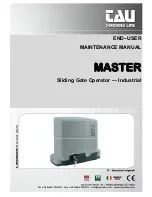
28
G
B
INSTALLATION PRINCE
PRE-INSTALLATION CHECK LIST
The gate leaves must be firmly fixed to the hinges on the gate pillars, they must not flex during
the movement and they must swing without any friction.
Before installing the operator, make sure you have enough room to fix the operator on the pillar.
In case the gate is like the one depicted in Pic. 1, there is no need for any modification.
Gate features and installation must comply with local regulations and standards.
The gate can be automated only if it is in good conditions and complies with EN12604 norms.
The gate leaf must not have a pedestrian doors in its frame. Should there be a pedestrian
opening, take the appropriate steps according to EN12435 norms (e.g. cutting out the motor
when the pedestrian door is opened by fixing a safety micro switch connected to the control
board).
Make sure not to create any trapping points or areas (e.g. with the gate completely opened,
between any opening in the gate frame and the side wall).
Parts to install meeting the EN 12453 standard
COMMAND TYPE
USE OF THE SHUTTER
Skilled persons
(out of public area*)
Skilled persons
(public area)
Unrestricted use
with manned operation
A
B
non possibile
with visible impulses
(e.g. sensor)
C or E
C or E
C and D, or E
with not visible impulses
(e.g. remote control
device)
C or E
C and D, or E
C and D, or E
automatic
C and D, or E
C and D, or E
C and D, or E
* a typical example are those shutters which do not have access to any public way
A: Command button with manned operation (that is, operating as long as activated), like
code ACG2013
B: Key selector with manned operation, like code ACG1010
C: Adjustable power of the motor
D: Safety strips and/or other safety devices to keep thrust force within the limits of EN12453
regulation - Appendix A.
E: Photocells, like code ACG8026 (To apply every 60÷70cm for all the height of the column
of the gate up to a maximum of 2,5m - EN 12445 point 7.3.2.1)
EMERGENCY MANUAL RELEASE
This applies only if the unit is not equipped with back-up batteries. In case of a black-out, the
gate can be pulled open after the operator has been unlocked with the emergency key provided
(rotate the key by 90° clockwise, Pic. 3).
Caution
In order to be able to manually open the gate leaf make sure of the following:
- The gate leaves must be endowed with appropriate handles;
- Position of the handles onto the gate leaves must be in risk free area;
- The manual force necessary to move the gate leaves should not be higher than 225 N, in case
of installations at domestic/private dwellings, and 390N in case of installations in business
premises (according to points 5.3.5 of the EN12453 norm).
Note:
in case of an installation with an overlapping two leave swing gate to ensure a safe/
proper locking a mechanical bolt must be installed along with an electric lock. The
mechanical bolt (ACG5000) must be installed at the bottom of the first gate leaf to close
so that it will be simply operated by the pressure of the second gate leaf. The electric
lock will simply latch one gate leaf to the other.
FIXING THE ACTUATOR ATTACHMENT TO THE COLUMN
To obtain a correct movement of the gate leaf, it is necessary to comply with the measurements
given (Pic. 4, 5, 7, 8, 9)
In case an iron pillar is available, weld the bracket straight to it.
In case you need to fix the bracket onto a concrete pillar, use the fixing plate as shown in picture
4, that will have to be fastened with 4 Fischer screws of Ø 8 mm.
In case you have a wall parallel to gate leaves when in open position, you must allow for a niche
in which the operator can fit in.
FIXING THE ACTUATOR ATTACHMENT TO THE GATE
Weld the second bracket to the gate (pictures 6, 9)
During installation make sure to comply with the measurements mentioned in the table below.
Fix the PRINCE and try several times to open and to close the gate, controlling that the cover
does not touch the moving gate.
3
5
4
6
8
Grease
thoroughly
Be sure to tighten the bolt
that holds the bracket to
the operator so that it can
rotate freely.
YES !
The operator must not
vary its height during the
movement.
NO !
















































